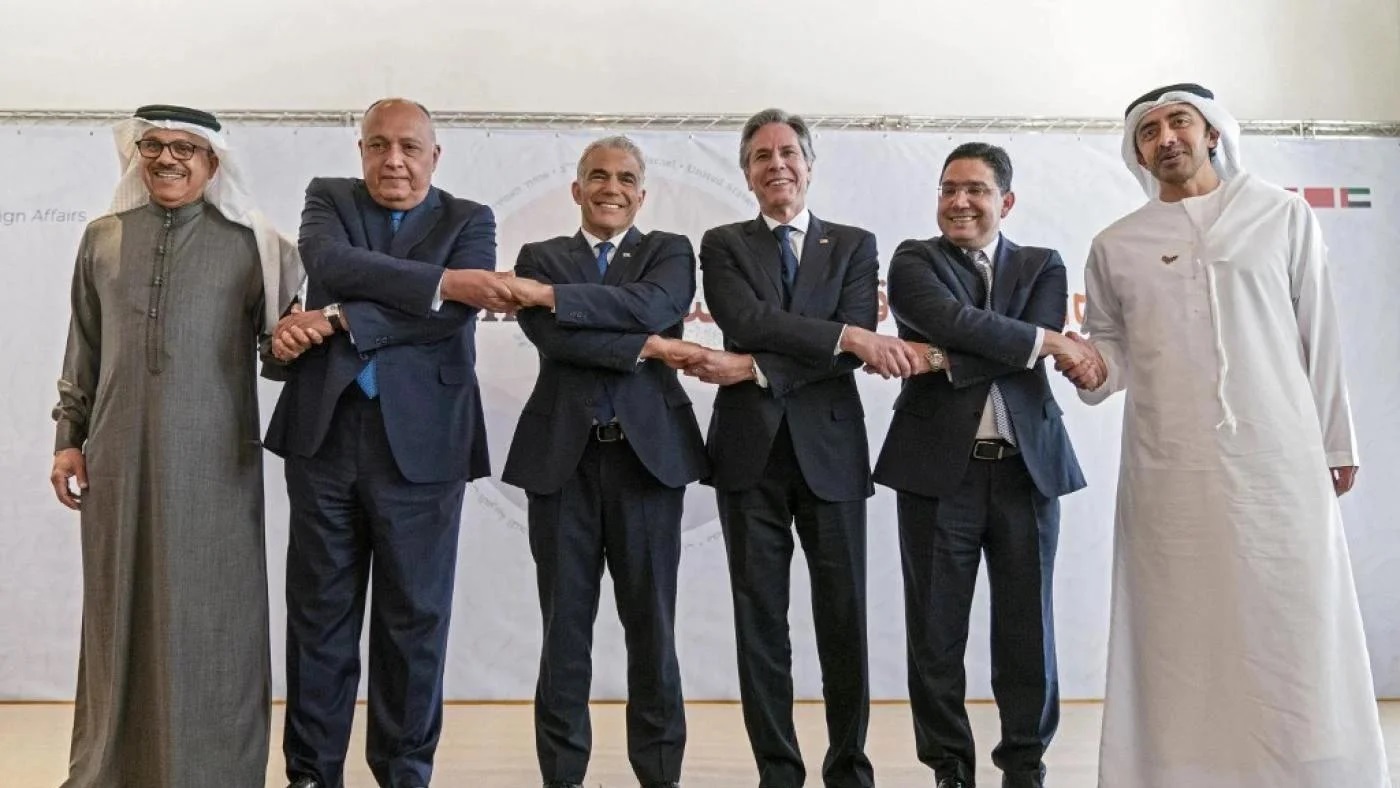David Ben – Gurion, the founder and the first prime minister of the Zionist regime made effort to expand the influence radius of the regime from Nile to Euphrates through applying force and dominance over the territories of Arab countries. At the outset of the establishment of the Zionist regime in 1948, he had proposed to insert two parallel blue lines as the symbol of the two rivers of Nile and Euphrates which implies the expansion of the geographical sphere of Israeli regime from Nile to Euphrates in the regime’s flag.
In the recent meeting, Sameh Shoukry, Egyptian Minister of Foreign Affairs, Nasser Bourita, Morocco’s Minister of Foreign Affairs, Abdullatif bin Rashid Al Zayani, Foreign Minister of Bahrain, Sheikh Abdullah bin Zayed Al Nahyan, Minister of Foreign Affairs and International Cooperation of UAE, Antony Blinken, the U.S. Secretary of State, and Yair Lapid, Minister of Foreign Affairs of the Zionist regime reviewed the plan called architecture of the regional security.
The purpose of the Zionist regime to hold this meeting in a short distance from the final home of David Ben – Gurion, the former prime minister of the regime was to send the message to the Arab world that Ben – Gurion’s dream to expand the influence sphere of the regime from Nile to Euphrates is realizable.
On the other hand, coincided with the beginning of the meeting of the foreign ministers of Arab compromising countries with the U.S. Secretary of State and Israeli regime foreign minister, Palestinian combatants launched a martyrdom – seeking operation in Al – Khaseira region located in Haifa township that took a number of the Zionists’ lives, sent an opposite message that believed the Palestinian nation will continue their path to confront physically with the Zionist regime.
Having condemned the compromising meeting of some Arab regimes and the Zionist regime in Negev desert, Palestinian combatant movements called the meeting as an organized conspiracy against the Palestinian nation and the axis of resistance, and emphasized that the people of Palestine will continue to go ahead along with the path of Jihad and martyrdom.
Plan for architecture of the regional security aims to form Arab-Hebrew NATO
In the meeting that Palestinians called it as the meeting of foreign ministers of politically bankrupted countries, the most important agenda was the modality to form an Arab – Hebrew NATO to confront Iran and the axis of resistance. The purpose of the plan of an architecture for the regional security was to gradually move towards the formation of an Arab – Hebrew NATO to confront the axis of resistance and Iran, the plan was brought to the attention of the U.S. and the Zionist regime long time ago.
The plan initiated since 2016 when Donald Trump the former U.S. president entered into the While House, and was in the limelight of the Zionist lobby, the U.S., the Zionist regime and some Arab compromising countries. At the time, Benjamin Netanyahu, the then prime minister of the Zionist regime, had made effort to gradually form a military bloc called regional NATO through organizing an Arab – Hebrew coalition against Iran.
The trips made by various authorities of the Zionist regime to Arab countries of the region including to some member countries of the Persian Gulf Cooperation Council (PGCC) paved the ground for preparation of an Arab – Hebrew NATO, but with the failure of Donald Trump in 2020 presidential election, the issue was temporarily shelved.
Now, once again the issue has become one of the agenda of Naftali Bennett cabinet, but the bloc will naturally continue to remain as a dream for the authorities of the Zionist regime, because the extremist methods of Naftali Bennett, the prime minister of the Zionist regime to develop the settlements in the territories of 1967, and specifically in East Quds will lead to the breach of the ceasefire declared between Palestinian combatant movements and the Zionist regime.
On the other hand, coincided with the meeting, the cabinet of Naftali Bennett took a measure contrary to the United Nations Security Council Resolutions, and approved the construction of four Jewish settlements in Negev desert beside the Sde Boker township. Regardless of the nature of the meeting of foreign ministers of UAE, Egypt, Morocco and Bahrain with the U.S. Secretary of State and the foreign minister of the Zionist regime, the formation of an Arab – Hebrew NATO will continue to remain as a dream for the leaders of the Zionist regime.
The reason to this end is the four Arab countries of Egypt, UAE, Morocco and Bahrain as well as the Zionist regime are considered to be as a part of the U.S. political and security sub – division, and formation of an Arab – Hebrew coalition against Iran will be faced with negative reaction of Islamic and Arab nations.
Intensification of martyrdom – seeking operations of Palestinian combatants in the occupied territories that took place after the end of the meeting of four Arab foreign ministers plus the Zionist regime’s and the U.S. Secretary of State in Negev, indicates the reality that the people of Palestine interpret the meeting, at first stage, as a joint Arab – Hebrew plot against the Palestinian nation.
Martyrdom – seeking operation of Palestinian combatants in South Tel Aviv that took place 48 hours after Al – Khaseira operation and left 14 deaths and injuries of Zionists, was the second practical reaction of the people of Palestine to Negev meeting.










0 Comments